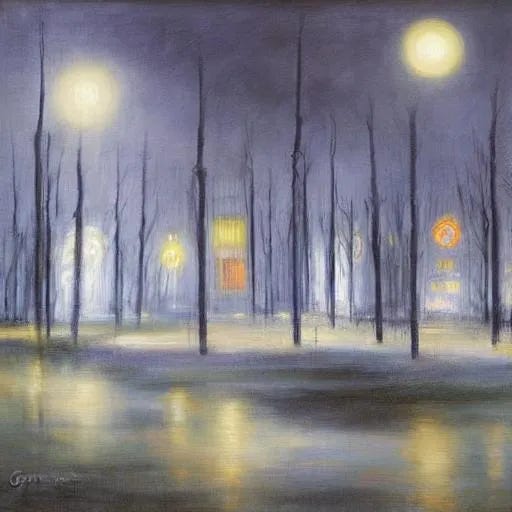Readers unfamiliar with "Night-Side" may prefer to read these notes only after reading the story.
"Night-Side" (1977) by Joyce Carol Oates can be found in the "Fabulous Formless Darkness" section of David G. Hartwell's 1987 anthology The Dark Descent, between "Crouch End" and "Seaton's Aunt."
"Night-Side" is a richly textured tour de force of historical fiction. It takes place in the 1880s, and is a series of diary entries about the investigation of Massachusetts medium Mrs. A— by two learned men from the Society for Psychical Research. The younger, narrator Jarvis Williams, follows the lead of the senior: the dashing, amiable, and dogmatic Perry Moore.
Oates does an excellent job unfolding the intellectual assumptions of her investigators.
[….] He is, of course, the perfect investigator in spiritualist matters since he is detached from the phenomena he observes and yet he is indefatigably curious; he has a positive love, a mania, for facts. Like the true scientist he seeks facts that, assembled, may possibly give rise to hypotheses: he does not set out with a hypothesis in mind, like a sort of basket into which certain facts may be tossed, helter-skelter, while others are conveniently ignored. In all things he is an empiricist who accepts nothing on faith....
“Telepathy indeed. There can be no other explanation,” Dr. Moore says emphatically. “By some means not yet known to science . . . by some uncanny means she suppresses her conscious personality . . . and thereby releases other, secondary personalities that have the power of seizing upon others’ thoughts and memories. It’s done in a way not understood by science at the present time. But it will be understood eventually. Our investigations into the unconscious powers of the human mind are just beginning; we’re on the threshold, really, of a new era.”
“So she simply picks out of her clients’ minds whatever they want to hear,” I say slowly. “And from time to time she can even tease them a little—insult them, even: she can unloose a creature like that obnoxious Webley upon a person like Judge T— without fear of being discovered.
Telepathy . . . Yes, that would explain a great deal. Very nearly everything we witnessed tonight.”
“Everything, I should say,” Dr. Moore says.
The centerpiece of "Night-Side" is a seance conducted by Mrs. A—, which goes from typically absurd spiritualist mummery to something shattering.
The sitting continued in this chaotic way for some minutes. Mrs. P— must have been quite disappointed, since she had wanted to be put in contact with her deceased husband. (She needed advice on whether or not to sell certain pieces of property.) Spirits babbled freely in English, German, Gaelic, French, even in Latin, and at one point Dr. Moore queried a spirit in Greek, but the spirit retreated at once as if not equal to Dr. Moore’s wit. The atmosphere was alarming but at the same time rather maniac; almost jocular. I found myself suppressing laughter. Something touched the back of my head and I shivered violently and broke into perspiration, but the experience was not altogether unpleasant; it would be very difficult for me to characterize it.
And then—
And then, suddenly, everything changed. There was complete calm. A spirit voice spoke gently out of a corner of the room, addressing Perry Moore by his first name in a slow, tentative, groping way. “Perry? Perry . . .?” Dr. Moore jerked about in his seat. He was astonished; I could see by his expression that the voice belonged to someone he knew.
“Perry . . .? This is Brandon. I’ve waited so long for you, Perry, how could you be so selfish? I forgave you. Long ago. You couldn’t help your cruelty and I couldn’t help my innocence. Perry? My glasses have been broken—I can’t see. I’ve been afraid for so long, Perry, please have mercy on me! I can’t bear it any longer. I didn’t know what it would be like. There are crowds of people here, but we can’t see one another, we don’t know one another, we’re strangers, there is a universe of strangers—I can’t see anyone clearly—I’ve been lost for twenty years, Perry, I’ve been waiting for you for twenty years! You don’t dare turn away again, Perry! Not again! Not after so long!”
Dr. Moore stumbled to his feet, knocking his chair aside.
“No—Is it—I don’t believe—”
“Perry? Perry? Don’t abandon me again, Perry! Not again!”
“What is this?” Dr. Moore cried.
He was on his feet now; Mrs. A— woke from her trance with a groan. The women from Brookline were very upset and I must admit that I was in a mild state of terror, my shirt and my underclothes drenched with perspiration.
The sitting was over. It was only seven-thirty.
“Brandon?” Dr. Moore cried. “Wait. Where are—? Brandon? Can you hear me? Where are you? Why did you do it, Brandon? Wait! Don’t leave! Can’t anyone call him back—Can’t anyone help me—”
Mrs. A— rose unsteadily. She tried to take Dr. Moore’s hands in hers but he was too agitated.
“I heard only the very last words,” she said. “They’re always that way—so confused, so broken—the poor things—Oh, what a pity! It wasn’t murder, was it? Not murder! Suicide—? I believe suicide is even worse for them! The poor broken things, they wake in the other world and are utterly, utterly lost—they have no guides, you see—no help in crossing over—They are completely alone for eternity—”
“Can’t you call him back?” Dr. Moore asked wildly. He was peering into a corner of the parlor, slightly stooped, his face distorted as if he were staring into the sun. “Can’t someone help me? . . . Brandon? Are you here? Are you here somewhere? For God’s sake can’t someone help!”
“Dr. Moore, please, the spirits are gone—the sitting is over for tonight—”
“You foolish old woman, leave me alone! Can’t you see I—I—I must not lose him—Call him back, will you? I insist! I insist!”
“Dr. Moore, please—You mustn’t shout—”
“I said call him back! At once! Call him back!”
Then he burst into tears. He stumbled against the table and hid his face in his hands and wept like a child; he wept as if his heart had been broken.
And so today I have been reliving the séance. Taking notes, trying to determine what happened. A brisk windy walk of ten miles. Head buzzing with ideas. Fraud? Deceit? Telepathy? Madness?
What a spectacle! Dr. Perry Moore calling after a spirit, begging it to return—and then crying, afterward, in front of four astonished witnesses.
Dr. Perry Moore of all people....
The remainder of "Night-Side" details Perry Moore's descent from amiable dogmatic materialist to unamiable dogmatic spiritualist. Jarvis fills his diary with details of his attempts to drown-out the implications of the seance by swimming in the ocean.
Jarvis has already listed a series of hypotheses to explain spirit communication in seances: everything from fraud through telepathy to genuine supernatural activity.
He concludes:
III. Alternative hypothesis
Madness: the medium is mad, the clients are mad, even the detached, rationalist investigators are mad.
Joyce Carol Oates has made many contributions to the genre; I wrote about one of her more recent entries here last year. It has several formal similarities with "Night-Side."
Jay
16 June 2023






